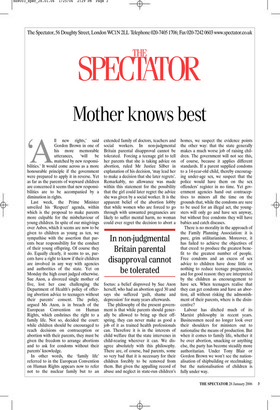Mother knows best
‘A ll new rights,’ said Gordon Brown in one of his more memorable utterances, ‘will be matched by new responsibilities.’ It would come across as a more honourable principle if the government were prepared to apply it in reverse. Yet as far as the parents of wayward children are concerned it seems that new responsibilities are to be accompanied by a diminution in rights.
Last week, the Prime Minister unveiled his ‘Respect’ agenda, within which is the proposal to make parents more culpable for the misbehaviour of young children. In spite of our misgivings over Asbos, which it seems are now to be given to children as young as ten, we sympathise with the assertion that parents bear responsibility for the conduct of their young offspring. Of course they do. Equally clearly, it seems to us, parents have a right to know if their children are involved in any way with agencies and authorities of the state. Yet on Monday the high court judged otherwise. Sue Axon, a divorced single mother of five, lost her case challenging the Department of Health’s policy of offering abortion advice to teenagers without their parents’ consent. The policy, argued Ms Axon, is in breach of the European Convention on Human Rights, which enshrines the right to a family life. Not so, decided the court: while children should be encouraged to reach decisions on contraception or abortion with their parents, they must be given the freedom to arrange abortions and to ask for condoms without their parents’ knowledge.
In other words, the ‘family life’ referred to in the European Convention on Human Rights appears now to refer not to the nuclear family but to an extended family of doctors, teachers and social workers. In non-judgmental Britain parental disapproval cannot be tolerated. Forcing a teenage girl to tell her parents that she is taking advice on abortion, ruled Mr Justice Silber in explanation of his decision, ‘may lead her to make a decision that she later regrets’. Remarkably, no allowance was made within this statement for the possibility that the girl could later regret the advice she was given by a social worker. It is the apparent belief of the abortion lobby that while women who are forced to go through with unwanted pregnancies are likely to suffer mental harm, no woman could ever regret the decision to abort a foetus: a belief disproved by Sue Axon herself, who had an abortion aged 30 and says she suffered ‘guilt, shame and depression’ for many years afterwards.
The philosophy of the present government is that while parents should generally be allowed to bring up their offspring, they can never make as good a job of it as trained health professionals can. Therefore it is in the interests of child welfare that the state intervenes in child-rearing wherever it can. We disagree absolutely with this philosophy. There are, of course, bad parents, some so very bad that it is necessary for their children forcibly to be removed from them. But given the appalling record of abuse and neglect in state-run children’s homes, we suspect the evidence points the other way: that the state generally makes a much worse job of raising children. The government will not see this, of course, because it applies different standards. If a parent supplied condoms to a 14-year-old child, thereby encouraging under-age sex, we suspect that the police would have them on the sex offenders’ register in no time. Yet government agencies hand out contraceptives to minors all the time on the grounds that, while the condoms are sure to be used for an illegal act, the youngsters will only go and have sex anyway, but without free condoms they will have babies and catch diseases.
There is no morality in the approach of the Family Planning Association: it is pure, grim utilitarianism. Moreover, it has failed to achieve the objectives of that creed: to produce the greatest benefit to the greatest number of people. Free condoms and an excess of sex advice to children have done little or nothing to reduce teenage pregnancies, and for good reason: they are interpreted by the children as encouragement to have sex. When teenagers realise that they can get condoms and have an abortion, all without risking the admonishment of their parents, where is the disincentive?
Labour has ditched much of its Marxist philosophy in recent years. Businessmen need no longer look over their shoulders for ministers out to nationalise the means of production. But when it comes to family life, whether it be over abortion, smacking or anything else, the party has become steadily more authoritarian. Under Tony Blair or Gordon Brown we won’t see the nationalisation of shipbuilding or steelmaking; but the nationalisation of children is fully under way.






















































 Previous page
Previous page